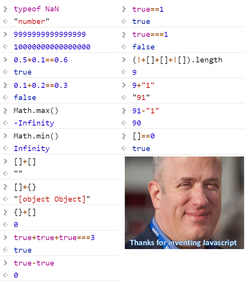Belisarius Cawl
kiwifarms.net
- Joined
- Mar 16, 2024
A few of these are just a counterintuitive consequence of the floating-point standard (though JavaScript should always have natively supported more than floats). Most are a long-term price paid for the very temporary convenience of weak typing that was with JavaScript from the beginning. I definitely blame Perl 5 for the remainder of this crap not accounted for towards the beginning:muh bACKwards compatibility and sheit
